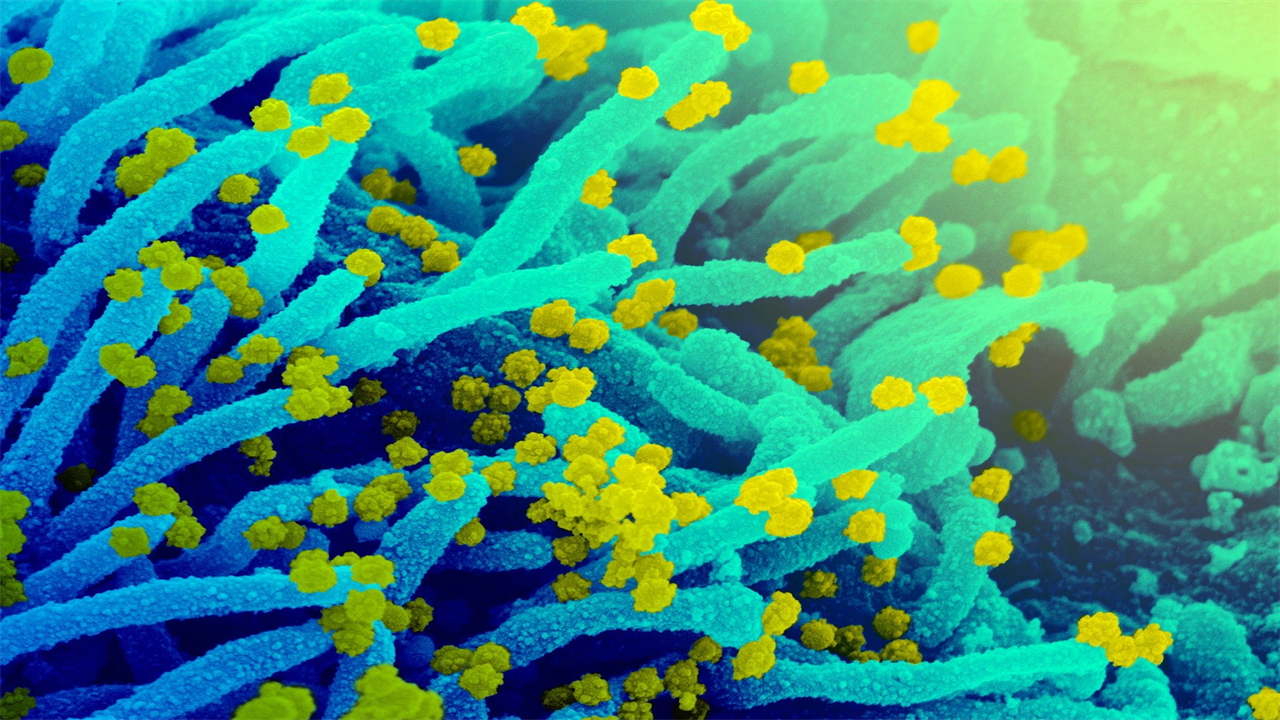NIH-Supported Long-Term Study of Children With COVID-19 Begins
0 View
Share this Video
- Publish Date:
- 19 November, 2021
- Category:
- Covid
- Video License
- Standard License
- Imported From:
- Youtube
Tags

This scanning electron microscope image shows SARS-CoV-2 (round yellow particles) emerging from the surface of a cell grown in the lab. SARS-CoV-2, is the virus that causes COVID-19. Credit: NIAID
NIH-supported research will track the effects of COVID-19 infection on children over the age of three.
A large, long-term study of the effects of COVID-19 on children has enrolled its first participant at the National Institutes of Health’s Clinical Center in Bethesda, Maryland. The study, which is supported by the National Institute of Allergy and Infectious Diseases (NIAID), part of the National Institutes of Health, will follow up to 1,000 children and young adults who previously tested positive for COVID-19 and evaluate the impact of COVID. -19 on their physical and mental health for three years. The study is expected to provide a detailed picture of the effects of COVID-19 on children’s overall health, their development and immune response to infection, and their overall quality of life in the years following infection. This work is part of NIH’s Researching COVID to Enhance Recovery (RECOVER) Initiative, to better understand the long-term consequences of SARS-CoV-2 infection.
In the early days of the COVID-19 pandemic, the first data suggested that children were less likely to have severe cases of COVID-19 than older people. However, of the 6 million reported pediatric COVID-19 cases in the United States, many children have experienced significant acute and long-term effects of the disease. While more and more children are eligible for a COVID-19 vaccine, the lack of vaccine-derived protection for most children has made this age group particularly vulnerable to infection. In addition, children can suffer from a range of inflammatory symptoms, collectively called Multisystem Inflammatory Syndrome in Children (MIS-C), which can affect multiple organs and lead to serious illness. MIS-C can occur even when the child initially appeared asymptomatic for COVID.
“While we know that children are vulnerable to COVID-19, we still don’t have a clear picture of how COVID-19 affects them in the long term,” said NIAID Director Anthony S. Fauci, MD. Long-term consequences of COVID, including post-acute COVID-19, can significantly affect quality of life. Our study of the pediatric population will deepen our understanding of the public health impacts that the pandemic has had and will continue to have in the months and years to come.”
Participants in the study are enrolled with the consent of their parents or guardians. The NIH Clinical Center will recruit children, ages 3 to 21, and the Children’s National Hospital in Washington, DC, will recruit children, ages birth to 21. In addition to tracking the long-term effects of COVID-19 on health and trying to determine risk factors for complications, the study will also evaluate long-term immune responses to the disease, screening for genetic factors that may influence how children respond. on COVID-19 -19 infection, and determine whether immunological factors influence long-term outcomes.
Children may be eligible to enroll if they have tested positive for COVID-19 in the past, even if they were asymptomatic. Participants will receive a complete physical examination and a complete medical history. Study doctors will collect a variety of baseline samples, including blood, nasal swabs, stool, and urine. An optional genetic analysis may be performed to identify potential genetic risk factors for severe COVID-19 outcomes. Participants will also undergo scans of their hearts and other organs. Members of their household without a history of COVID infection will also be asked to enroll as part of a control cohort. In total, the study can enroll up to 2,000 people, the participants who have tested positive for COVID-19 and their household contacts.
Children and young adults who enroll within 12 weeks of a COVID-19 infection or a positive COVID-19 test visit a clinic for follow-up at three and six months, and then every six months for a total of three years. Those who enroll more than 12 weeks after a positive COVID-19 test will have clinic visits every six months for three years. During these follow-up visits, participants undergo additional scans, sample analyses, questionnaires and other ways to monitor their health, development and overall quality of life, including their mental and social well-being. Any reinfections or side effects that may be related to a previous COVID-19 infection will be documented. The researchers expect the study to take approximately six years to complete.
For more information about the study, visit ClinicalTrials.gov using the study identifier NCT04830852.
NIAID conducts and supports research – at NIH, in the United States and worldwide – to study the causes of infectious and immune-mediated diseases and to develop better tools to prevent, diagnose, and treat these diseases.
About the National Institutes of Health (NIH): NIH, the national medical research agency, comprises 27 institutes and centers and is part of the United States Department of Health and Human Services. NIH is the primary federal agency that conducts and supports basic, clinical, and translational medical research, investigating the causes, treatments, and cures for both common and rare diseases.










